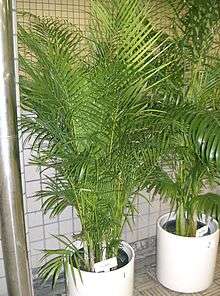Dypsis lutescens
| Butterfly Palm | |
|---|---|
 | |
| Scientific classification | |
| Kingdom: | Plantae |
| (unranked): | Angiosperms |
| (unranked): | Monocots |
| (unranked): | Commelinids |
| Order: | Arecales |
| Family: | Arecaceae |
| Genus: | Dypsis |
| Species: | D. lutescens |
| Binomial name | |
| Dypsis lutescens (H.Wendl.) Beentje & J.Dransf. | |
| Synonyms[1] | |
| |
Dypsis lutescens, also known as bamboo palm, golden cane palm, areca palm,[2] yellow palm,[2] or butterfly palm,[2] is a species of flowering plant in the Arecaceae family, native to Madagascar and naturalized in the Andaman Islands, Réunion, El Salvador, Cuba, Puerto Rico, Haiti, the Dominican Republic, Jamaica, the Leeward Islands and the Venezuelan Antilles.[1][2]
Description
Dypsis lutescens grows 6–12 m (20–39 ft) in height. Multiple stems emerge from the base. The leaves are arched, 2–3 m (6 ft 7 in–9 ft 10 in) long, and pinnate, with 40-60 pairs of leaflets. It bears panicles of yellow flowers in summer. Offsets can be cut off when mature enough, as a propagation method.
It is grown as an ornamental plant in gardens in tropical and subtropical regions, and elsewhere indoors as a houseplant. It has gained the Royal Horticultural Society's Award of Garden Merit.[3]
One of several common names, "butterfly palm" refers to the leaves which curve upwards in multiple stems to create a butterfly look.[4]
.jpg)
In its introduced range, this plant acts as a supplier of fruit to some bird species which feed on it opportunistically, such as Pitangus sulphuratus, Coereba flaveola and Thraupis sayaca species in Brazil.[5]
Air quality
According to NASA and Dr. B. C. Wolverton, the areca palm filters xylene and toluene from the air. Wolverton also specifies that, at 1.8 m (5 ft 11 in) in height, the plant will transpire 1 liter of water per 24 hours, thereby making it an effective humidifier.[6]
References
- 1 2 WCSP, World Checklist of Selected Plant Families: Dypsis lutescens
- 1 2 3 4 United States Department of Agriculture. "Dypsis lutescens information from NPGS/GRIN". USDA, Agricultural Research Service, Germplasm Resources Information Network (GRIN). United States Department of Agriculture. Retrieved 2010-12-25.
- ↑ "Dypsis lutescens". Royal Horticultural Society. Retrieved 25 July 2013.
- ↑ "Real Palm Trees". Palm Tree General Description.
- ↑ Leonardo Barros Ribeiro & Melisa Gogliath Silva. "Comportamento alimentar das aves Pitangus sulphuratus, Coereba flaveola e Thraupis sayaca em palmeiras frutificadas em área urbana" (in Portuguese).
- ↑ "How to Grow Your Own Fresh Air" using Areca Palm (Chrysalidocarpus lutescens) (TED talk)
External links
- PACSOA: Dypsis lutescens
- Part of this article was compiled from the Portuguese Wikipedia article.